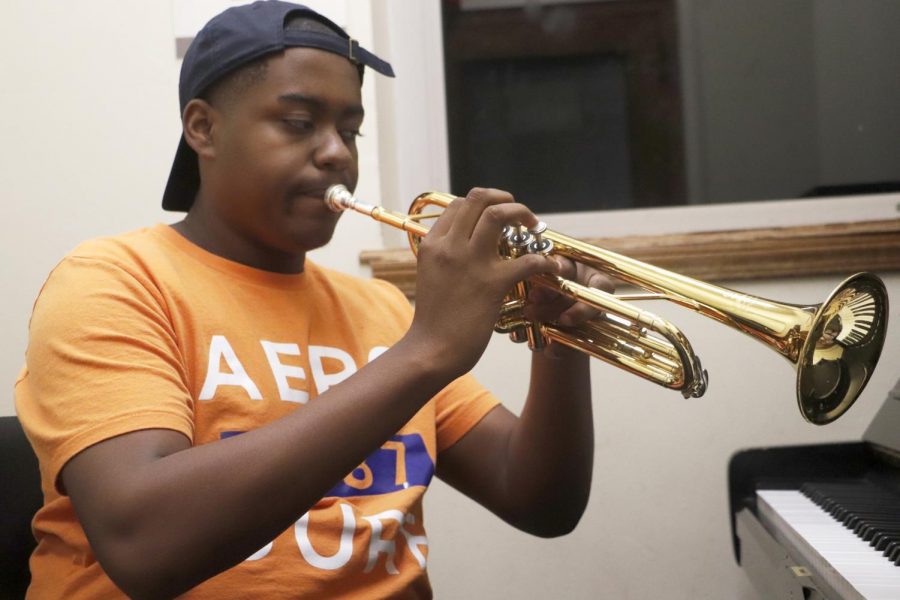Music majors elaborate on the importance of practicing
Maggie Tregre/The Lion’s Roar
Brian White, a freshman music major, practices on the trumpet. Music majors must practice whenever they can to keep up with their instrument.
Aside from taking usual classes, music majors also need to make time for performances, practices and recitals.
Not all college students are aware of the level of practice and dedication that accompanies a music major on the path to earning a degree.
Logan Bergeron, a junior music major, explained the role practice plays in keeping up with an instrument and responsibilities as a music major.
“It’s probably one of the most important things about the degree honestly,” stated Bergeron. “I just feel like it’s not just learning how to play the instrument really well, but like being able to practice all those hours of the day every week. It kind of teaches you responsibility because everyone knows what’s going to happen if you don’t practice enough, you fall off.”
Carly Bateman, a freshman music major, has a concentration in vocal performance. Bateman shared a recent personal experience.
“Every spare second that I have, I need to be practicing,” stressed Bateman. “I just got over a sickness, so I’m behind a lot.”
Bateman also emphasized the importance of warming up, even before practicing, especially when it comes to vocal music majors.
“You always have to warm up because if you sing without warming up, you can damage your vocal chords,” explained Bateman.
Alexis Dunn, a junior music major, also feels practice is very important for music majors.
“Very, very, very important,” stressed Dunn. “It’s to the enthusiasm. Let’s say, you were going to get a piece today–you were supposed to learn it like two days ago. That’s how important it is. I’m not saying it’s that intense, but it’s very, very, very important. I try to practice between three and four hours a day.”
Music theory teaches students the elements of constructing a piece of music, including notation, building chords, analyzing rhythm, harmony, melody and more. Bergeron explained that musical composition is required for those courses, but not necessarily for performances.
“You aren’t required to compose your own stuff and then perform it,” explained Bergeron. “But I mean technically, with music theory, yes, because most of the time, especially with the theory class that I’m in, with the chord-building, technically that is composition. I do have to write my own stuff, but I don’t necessarily have to perform it in front of a crowd or anything.”
Music students are graded on a variety of criteria including attendance, participation and improvement, as well as musicianship and technique during lessons, master classes, recitals and board examinations. The board examinations are called jury exams and are held at the end of each semester. Bergeron elaborated on this process.
“Every semester, we have these things called juries, and at the end of every semester, we have a panel of judges from the music school that basically sit and listen to each person individually play a few minutes of a solo or something like that,” explained Bergeron. “And they grade you off of that.”
Dunn explained how music majors are graded.
“Our performances are our tests,” elaborated Dunn. “For example, guitar ensemble has our recital on Nov. 13. That’s going to be our test. That’s going to be our grade. How well we do between the beginning of the semester and recital day, in our lessons, he gives us grades for that too.”
Bateman shared what it takes to earn a bachelor’s degree in music.
“Just hard work and dedication,” added Bateman. “You can’t be a music major if you don’t love it.”
Your donation will support The Lion's Roar student journalists at Southeastern Louisiana University.
In addition, your contribution will allow us to cover our annual website hosting costs.
No gift is too small.

Brynn Lundy Arriago began working for The Lion's Roar in the fall of 2019, her first semester at Southeastern, and now serves as Graduate Assistant. From...





